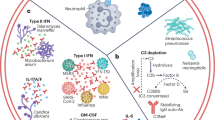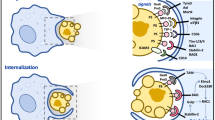Abstract
THE competence of animals to respond immunologically develops for different antigens at different stages of ontogeny1. Thus C57 Bl mice do not form antibodies to sheep red blood cells (sRBC) during the first 10 days after birth even though such newborns can respond to a number of other antigens2. We and others previously demonstrated that antibody formation to sRBC can be “turned on” prematurely when newborns are given macrophages from adults at or near the time of antigen administration3,4. More recently we observed that such premature antibody formation can be achieved without the transfer of macrophages provided that the antigen is administered in conjunction with bacterial endotoxin (LPS) or double-stranded synthetic polynucleotides, agents that are known to enhance the metabolic activities of macrophages5–7.
This is a preview of subscription content, access via your institution
Access options
Subscribe to this journal
Receive 51 print issues and online access
$199.00 per year
only $3.90 per issue
Buy this article
- Purchase on Springer Link
- Instant access to full article PDF
Prices may be subject to local taxes which are calculated during checkout
Similar content being viewed by others
References
Sterzl, J., and Silverstein, A. M., Adv. in Immunol., 6, 337 (1967).
Hechtel, M., Dishon, T., and Braun, W., Proc. Soc. Exp. Biol. and Med., 120, 728 (1965).
Braun, W., and Lasky, L. J., Fed. Proc., 26, 642 (1967).
Argyris, B. F., J. Exp. Med., 128, 459 (1968).
Woods, M., Landy, M., Burk, D., and Howard, T., in Bacterial Endotoxins (edit. by Landy, M. and Braun, W.) (Institute of Microbiology, Rutgers, The State University, 1964).
Braun, W., Nakano, M., Jaraskova, L., Yajima, Y., and Jimenez, L., in Nucleic Acids in Immunology (edit. by Plescia, O. J. and Braun, W.), 347 (Springer-Verlag, New York, 1968).
Johnson, H. G., and Johnson, A. G., Bact. Proc., 75 (1968).
Jerne, N. K., Nordin, A. A., and Henry, C., in Cell-Bound Antibodies (edit. by Amos, B. and Koprowski, H.) (Wistar Institute Press, Philadelphia, 1963).
Weigle, W. O., Natural and Acquired Immunologic Unresponsiveness (World Public Co., Cleveland, 1967).
Braun, W., in Nucleic Acids in Immunology (edit. by Plescia, O. J. and Braun, W.), 535 (Springer-Verlag, New York, 1968).
Braun, W., in Immunological Tolerance (edit. by Landy, M. and Braun, W.) (Academic Press, New York, 1969).
Author information
Authors and Affiliations
Rights and permissions
About this article
Cite this article
WINCHURCH, R., BRAUN, W. Antibody Formation: Premature Initiation by Endotoxin or Synthetic Polynucleotides in Newborn Mice. Nature 223, 843–844 (1969). https://doi.org/10.1038/223843a0
Received:
Revised:
Issue Date:
DOI: https://doi.org/10.1038/223843a0
This article is cited by
-
Modulation of the immune system by synthetic polynucleotides
Springer Seminars in Immunopathology (1979)
-
Poly I·Poly C and endotoxins share immunosuppressive properties and increase the toxicity of α-amanitin and hexobarbital
Agents and Actions (1971)
Comments
By submitting a comment you agree to abide by our Terms and Community Guidelines. If you find something abusive or that does not comply with our terms or guidelines please flag it as inappropriate.



